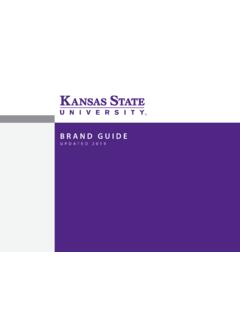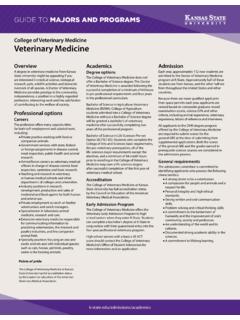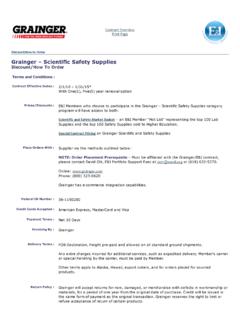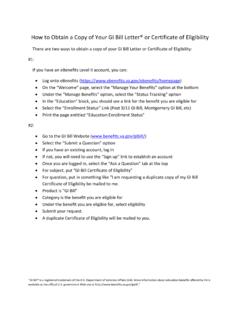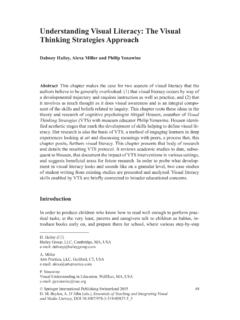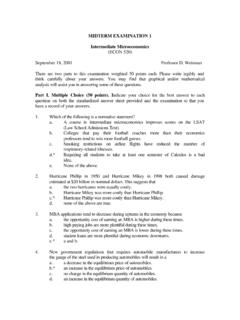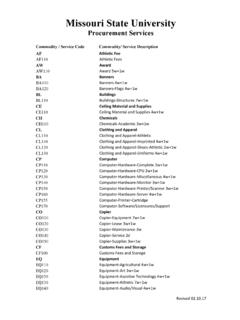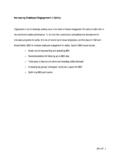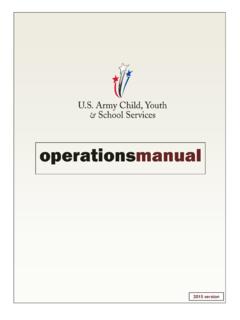Transcription of College of Agriculture Food Science and Industry - …
1 TO MAJORS AND PROGRAMSP oints of prideKansas State University s food Science and Industry program has nearly 100 percent employment placement of its of AgricultureFood Science and IndustryOverviewKansas State University s food Science and Industry degree prepares students for rewarding careers in food and allied industries. Our nationally recognized undergraduate food Science and Industry program is approved by the Institute of food Technologists, a nonprofit scientific society with members who work in food Science and related professions in Industry , academia and government.
2 Professional optionsCareersFood Science touches the lives of people in important ways because food is a basic need. Trained individuals with dedication and talent are constantly needed to continue supplying safe, high-quality food . Job opportunities in food Science are abundant, and often there are not enough applicants to meet placement food Science program at K-State prepares students for a variety of career fields such as:n food production operationsn Quality assurancen food microbiology and safetyn Process technology and engineeringn Business management and salesn Product development and evaluationn Consumer relationsn Advertising and promotion n Technical service EmployersA broad range of employers commonly seek food Science graduates.
3 Some examples:n Small, medium or large food companiesn State or federal government quality, safety or regulatory agenciesn Equipment companiesn Ingredient companiesn Microbiological or sanitation firmsn Technical marketing groupsn Advertising firmsn Biomedical companiesn Consumer research companies Some food Science graduates, especially those who speak a second language, will find opportunities with global food agencies and companies to meet critical food needs in other countries. AcademicsCourses will provide excellent training in the basic sciences as well as specialized education in food chemistry, food microbiology, food analysis, nutrition, food engineering, and product development and processing.
4 Professional elective courses can be selected to meet requirements for minors in business, cereal chemistry, economics, leadership and other areas. Professional electives are important to the food Science curriculum. You will work closely with your academic advisor to design a personalized, well-rounded course of study. You can choose from courses such as:n food Product Evaluationn food Safety and Securityn Nutritionn Agriculture Business Communicationsn Meat Sciencen Milk Processing and Dairy Foodsn Dairy Foodsn Grain Science and Bakery Science n Numerous business, management, marketing and finance courses Degree optionsThree options are available in the food Science and Industry program: Science , business and operations management, and technology.
5 The Science option emphasizes the basic sciences and prepares students for technical careers, product development and graduate school. Students in the Science option take courses in the life and biological sciences that meet requirements for health professional schools, including dentistry, medical, optometry, physical therapy, pharmacy, nursing, physician assistant, veterinary and other health-related schools. Pre-health students have academic advisors in both food Science and Industry and the pre-health in the business and operations management option can easily minor in either business or agribusiness as they prepare for management and other opportunities in the food Industry .
6 Students may switch from business to the Science option with counsel from their advisor. The Industry and technology option is designed for distance students interested in Science and Industry -based careers in product development, food safety, research or quality assurance. FacultyThe food Science program is part of the food Science Institute with about 45 faculty members from five K-State colleges and 11 departments. Many faculty serve in leadership roles within the food Industry and bring those experiences into the classroom. AdvisingFood Science faculty members are genuinely committed to teaching and serve as great advisors.
7 They make it a point to know their students with a strong emphasis on individual attention. Advisors not only provide guidance with academics and assist with career planning, but also are an excellent source of information on student employment and other concerns. The food Science Academic Resource Center allows students to borrow or check out textbooks required for general courses in the undergraduate curriculum at no cost. This program is designed to benefit students seeking an undergraduate food Science degree by reducing the ever-increasing costs associated with buying textbooks each of nondiscrimination Kansas State University prohibits discrimination on the basis of race, color, ethnicity, national origin, sex (including sexual harassment and sexual violence)
8 , sexual orientation, gender identity, religion, age, ancestry, disability, genetic information, military status, or veteran status, in the University s programs and activities as required by applicable laws and regulations. The person designated with responsibility for coordination of compliance efforts and receipt of inquiries concerning nondiscrimination policies is the University s Title IX Coordinator: the Director of the Office of Institutional Equity, 103 Edwards Hall, Kansas State University, Manhattan, Kansas 66506, (785) 532-6220. The campus ADA Coordinator is the Director of Employee Relations, who may be reached at 103 Edwards Hall, Kansas State University, Manhattan, Kansas 66506, (785) Statistics 2017 FacilitiesStudents train in state-of-the-art laboratories and pilot plants with skilled faculty, researchers and lab technicians.
9 The facilities include cereal and grain, dairy, meat and poultry, egg, thermal, extrusion, fermentation, sensory analysis and value-added processing/evaluation capabilities. ActivitiesClubsNumerous opportunities are available to students through the food Science Club. The club sells self-developed food products as a fundraiser, travels to Institute of food Technologists meetings and conferences, connects with professionals within the Industry , and participates in on-campus events offered through the College of Agriculture and its departments. Student teamsOptions include product development, dairy product judging, meats judging and other College of Agriculture competition teams.
10 Study abroadThe food Science Industry is global. Numerous study tours, short courses, internships and semester study abroad opportunities are available in Italy, France, Spain and more. Financial assistanceHigh school and transfer students pursuing the Science option are eligible for the Institute of food Technologists scholarships and may obtain application material at food Science majors are eligible to compete for many other scholarships and financial assistance. Suggested coursework General requirementsHrs. Courses 3 ENGL 100 Expository Writing I 3 ENGL 200 Expository Writing II 2 COMM 105 Public Speaking IA or 3 COMM 106 Public Speaking I2 3 Additional communications course 3 ECON 110 Macroeconomics 9 Social Science and humanities electives 4 BIOL 198 Principles of Biology 4 BIOL 455 General Microbiology 4 CHM 210 Chemistry I 4 CHM 230 Chemistry II 1 FDSCI 101 Foundations in food Science 3 FDSCI 302 Introduction to food Science 3 FDSCI 305 Fundamentals of food Processing 1 FDSCI 310 food Science Professional
